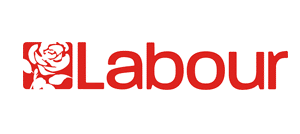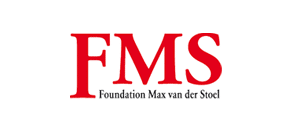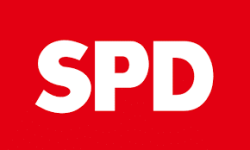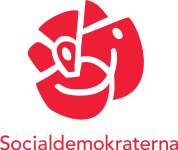Albania
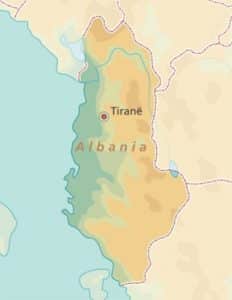
The last Albanian parliamentary elections took place in April 2021. During the elections, the Socialist Party (PS) managed to maintain its majority in parliament. The party gained 74 seats once again, which secured the third consecutive term of former mayor of Tirana and PS leader Edi Rama as Prime Minister. The Democratic Party (DP) became second, winning 59 seats. The Socialist Movement for Integration (LSI), lost the largest portion of its votes. Its number of seats decreased from 19 to 4. The minor Social Democratic Party of Albania (PSD) won 2 seats. Since the PS won a majority there is no government coalition. During the election campaign for the 2021 parliamentary elections, confrontations occurred between Ilir Meta, Albania’s president at the time from the LSI, and incumbent Prime Minister Edi Rama. Meta repeatedly accused Rama of trying to steal the parliamentary vote and referred to Rama’s government as a ‘’kleptocratic regime’’. Meta was succeeded by Bajram Begaj of the Socialist Party. He became the 9th president of Albania on 24 July 2022.
Albania gained EU candidate status on 24 June 2014 after reform efforts and encouragements were agreed by the EU’s Enlargement Commissioner. This was a key step in the right direction for a country that still has to deal with major corruption and crime issues. On March 25, 2020, the European Council decided to greenlight the opening of accession negotiations with Albania if they had fulfilled 15 conditions that were set up by the European Union. However, the start of accession negotiations was stalled due to a Bulgarian veto as the candidacy was linked to that of North Macedonia. On 24 June 2022, Bulgaria lifted its veto and after North Macedonia accepted a revision of the French Proposal on 16 July 2022, accession negotiations with Albania officially started on 19 July 2022.
-
Want to get notified by mail when this country gets updated?
Subscribe to our newsflash below!
Key Info
1 Political Situation
For the last decade, Albania has been plagued with several crises where the opposition boycotts the parliament. This happened again when the opposition parties Democracy Party (DP) and the Socialist Movement for Integration (SMI) boycotted the parliament in 2019. However, this boycott was ended after an agreement on electoral reforms was reached in June 2020. Nevertheless, tensions remained throughout 2020 and led to confrontations between Albania’s President Ilir Meta from the LSI and Edi Rama. In 2019, the parliament started an impeachment procedure against Meta. As a protest against this action, Meta actively organized antigovernment rallies and accused Edi Rama of attempting a coup and accused him of having links with international organized crime. On 16 February 2022, the Constitutional Court of Albania overturned the impeachment against Meta and ruled that accusations of the parliament against him were not in violation of the constitution.
During the election campaign for the 2021 parliamentary elections confrontations between Rama and Meta continued. Meta repeatedly accused Rama of trying to steal the parliamentary vote. The pre-election period was also marked by protests and violence. The incendiary rhetoric coming from both sides led the European Union to issue a warning that parties should uphold mutual respect, and dialogue and refrain from hate speech. In April, the pre-election atmosphere turned deadly when a shouting outside of Tirana left one person dead and four others injured. The incident occurred a few hours after President Meta intervened in the pre-electoral debates and called the government run by Rama a ‘’kleptocratic regime’’. He also accused Rama of inciting violence against opposition members.
In January 2022, the headquarters of Albania’s Democratic Party, a main opposition party within the Albanian political landscape, was violently stormed by protesters. The event followed an internal power struggle between former president Sali Berisha and the Democratic Party leader Lulzim Basha. Protestors were on the side of Berisha, who was thrown out of the party in 2011 and accused Basha of being a traitor and a “hostage” of current PM Edi Rama. Albania’s Democratic Party condemned the storming of the headquarters. Basha stepped down after following defeats in local elections against Berisha’s newly formed House of Freedom coalition. However, the disputed party leadership is now between Berisha, who is a persona non grata in the USA., and newly installed party leader Enkelejd Alibaej. As a result, political unrest remains and Berisha remains to push parts of the opposition to rally and protest against the government, with the most significant protest on 7 July 2022.
1.1: EU accession process
Albania signed an association agreement with the EU in 2006, applied for membership in April 2009 and garnered candidate membership in June 2014. Accession negotiations could begin in March 2020 in light of reforms made. The European Commission writes in its 2023 report that in the area of public administration, reforms still need to be made. When it comes to the judiciary, Albania is at moderate levels. Corruption is still prevalent in public administration and financial life – measures still have too limited an impact. Addressing the culture of impunity is a priority. Fighting organised crime requires stronger measures. Freedom of expression and media independence are still not a given – intimidation and lawsuits against journalists still take place. Too little has been done to protect national minorities. On the positive side, the Albanian economy is ready to “cope with competitive pressures and market forces within the EU“. Albania has made progress on monetary policy but independence remains to be improved. Foreign policy is in line with the EU common foreign and security policy.
Overall, the EU is satisfied with the reforms undertaken and the commitment to make progress. In most policy areas, Albania is at an average level. The commitment now needs to be converted into an accelerated reform drive.
1.2: Cyberattacks and Albanian-Irani relations
On 15 July 2022, Albanian digital governmental services were temporarily shut down due to cyberattacks, which are believed to be originating from Iran. Albanian-Irani relations are at an all-time low as tensions between the countries are running high since Albania decided to host the Mujahedin-e-Khalq organization (MEK) in 2014. MEK is considered to be a cult-like revolutionary group with a tumultuous history. Both the USA and the UK have determined the group as a terrorist organisation in the past but delisted the group in 2009 (UK) and 2012 (USA). Approximately 3,000 MEK supporters reside in Camp Ashraf 3 in Manez, roughly 30 kilometres west of Tirana. On 7 September 2022, Albanian authorities ordered all Iranian diplomats and staff to leave the embassy.
1.3: Human rights
Domestic and international human rights groups are generally able to operate without government restrictions and government officials are generally cooperative and responsive to their views. However, Albania does have significant human rights issues. These issues include problems with restrictions on free expression and the press, corruption in all branches of the government, and failure to enforce child labor laws. The independence of the judiciary also remains a problem in Albania. While individuals and organizations will try and seek civil remedies for human rights violations, courts were susceptible to corruption, inefficiency, intimidation, and political tampering. Albanian law guarantees the political rights of citizens regardless of ethnic, lingual, racial, or religious identity. However, Roma and other marginalized people remain vulnerable to political exploitation.
In July 2022, NGOs in Albania warned that arbitrary restrictions imposed by the Albanian government are affecting the media’s ability to function as a watchdog. In an open letter to Edi Rama, they warned about decisions that obstruct free and independent journalism in Albania. On the RSF’s World Press Freedom Index, Albania is ranking 103rd and is dropping annually by 20 places. The deteriorating press freedom in Albania is a big concern to civil society and the democratic process in Albania.
1.4: Women’s rights
Domestic violence is widespread in Albania. According to a UN Women survey from May 2019, 27 percent of the respondents experienced domestic violence from intimate partners in their lifetime. While the parliament has adopted some measures to combat domestic violence, few cases are prosecuted. Sexual violence against women also remains a problem in Albania. Rape, including spousal rape, is criminalized. The law also includes provisions for sexual assault. However, the government fails to effectively enforce the law. Overall, the police are poorly equipped to handle cases of domestic violence or spousal rape, which is often not understood to be a crime.
The law provides the same legal status and rights for women and men. However, the government does not enforce the law effectively. Women are underrepresented in many fields at the highest levels. Furthermore, the law mandates equal pay for equal work, but this is not implemented by many private employers.
1.5: LGBTQ rights
Violence and discrimination against LGBTIQ people are issues in Albania. In 2019, 65 cases of sexual violence and 152 cases of physical violence were reported to a national NGO. With regard to psychological violence, 232 cases were reported. Only 34 cases were reported to the police due to a lack of trust in the institutions, fear of coming out, or negative experiences with the police. Of the 34 cases that were reported, the authorities only took measures in one case. Hate speech incidents also increased in 2019. In 2022, a nationwide questionnaire revealed low acceptance levels among Albanians regarding interaction with LGBTIQ people in their daily lives. There were no significant differences in rural-urban division or age among the results. The results confirm that homophobia remains an important issue in the country.
Same-sex marriage is not recognized in Albania. While the Albanian NGO the Pink Embassy has requested the government to eliminate legal discrimination against LGBTQ persons and allow LGBTQ persons to get married and adopt children, there has been no progress regarding the issue. However, a positive development with regard to LGBTQ rights is that Albanian psychologists have banned the practice of conversion therapy. It is the third European country to ban the practice. In October 2020, Albania expanded its anti-discrimination law which included prohibiting discrimination on the grounds of sex characteristics and HIV status. However, an additional challenge to the amendment is to spread awareness among the LGBTQ community about the existence of this law and to institutionalise protection from discrimination.
2 Elections
2.1: Electoral system
Albania is a parliamentary republic with a unicameral parliament: the National Assembly. It consists of 140 members elected for a four-year term, and, under the constitutional guidelines, a government can be formed if a party or a coalition of parties gathers at least 71 seats in the National Assembly. The head of state in Albania is the president, who is elected for a five-year term by the parliament. The president has no legislative or executive power, but represents the state in foreign relations, and is the chief commander of the army.
Albania has a regional proportional voting system divided into 12 electoral regions. Capital Tirana, which is the largest region population-wise, elects 34 MPs. Political parties nominate an MP list for each region for the total number of seats. According to the electoral code, 30 per cent of the candidates in the top tier of the lists should be women, a rule that few parties respected in the June 2013 parliamentary elections. The prime minister is approved by the president with the approval of the parliament.
The 12 electoral constituencies correspond to the country’s 12 administrative regions. Within any constituency, parties must meet a threshold of 3 per cent, and pre-election coalitions must meet a threshold of 5 per cent. This is a consequence of the new electoral code introduced in 2009. The threshold has been largely criticised, because of the obstacle that it presents to smaller parties. In fact, of all the political parties in Albania, only the PS and the PD favoured the new electoral system. Smaller parties contended that the reform served only the interests of those two main parties, while largely, if not entirely, excluding small parties from entering the parliament.
The centre-left coalition headed by the PS declared after the June 2013 elections that all cabinet ministers will resign their parliamentary seats to provide for a better separation of power and checks and balances between the government and the legislative branch.
2.2: Parliamentary elections
On 25 April 2021, parliamentary elections took place, in which the Socialist Party of Albania won convincingly by obtaining 48.7 percent of the votes (74 out of 140 seats). Since 71 seats are needed for a majority, there will not be a parliamentary coalition. Former major of Tirana and SP leader, Edi Rama, will remain as Prime Minister for a third consecutive term. In the 2017 parliamentary elections, the PS also gained 74 seats. The unlikely opposition coalition of the Democratic Party of Albania (DP) and the Socialist Movement for Integration (LSI) was unable to gain a majority of the votes and topple Rama’s government. Though the DP was the election’s biggest winner, gaining 13, it did not matter. Most of its votes came from the LSI, which lost the largest portion of its votes. Its number of seats decreased from 19 to 4. The minor Social Democratic Party of Albania (PSD) gained 2 seats as well
Election results
| Parties | Votes | % | Seats | Seats in 2017 |
| Socialist Party (PS) | 768,250 | 48.68% | 74 (0) | 74 |
| Democratic Party of Albania (DP) | 622,265 | 39.43% | 59 (+13) | 43 |
| Socialist Movement for Integration (LSI) | 107,536 | 6.81% | 4 (-15) | 19 |
| Social Democratic Party of Albania (PSD) | 35,477 | 2.25% | 3 (+2) | 1 |
International observers
The OSCE Office for Democratic Institutions and Human Rights (ODIHR) published a final report on the observation mission for Albania’s 2021 parliamentary elections. The report stated that the elections offered a legal framework that supported the inclusiveness of campaigns and fair participation. . The pre-election environment did deal with partisan acts of localised violence according to NDI. Furthermore, there are several allegations of voter-buying and intimidation, as well as the SP’s alleged misuse of public resources and personal data to benefit them in the elections. There was also a relatively large number of invalid votes compared to previous elections according to NDI.
The ODIHR stated that in Albania’s crowded media environment, electoral campaigns are not proportionally broadcasted due to the owner’s interest and self-censorship. This limits voters in their ability to make an informed choice. There were no televised debates between political leaders. According to ODIHR, voting was smooth and calm, with preventive measures of the COVID-19 pandemic being respected, as well as the secrecy of voting and a largely transparent process. Some 30 criminal investigations of vote-buying and some 50 criminal cases on other irregularities were initiated in relation to the 2021 elections. Nonetheless, the ODIHR concludes that the election is considered an open and transparent process where parties’ procedural rights are respected and where decisions are reasonably justified.
Aftermath
The Albanian parliamentary elections of 2021 brought an end to the political crisis that started with the organisation of protests and rallies by opposition parties in February 2019. Rama’s Socialist Party won the elections and he personally claimed a third term as prime minister of Albania. Three days after the elections, 10 members of the Democratic Party called for Basha’s resignation as the leader of the party. He stayed on only to resign later after another defeat in the local elections of 2022.
2.3: Presidential elections
The head of state in Albania is the president, who is elected for a five-year term by the parliament. The president has no legislative or executive power, but represents the state in foreign relations, and is the chief commander of the army. Since June 4, 2022, the President of Albania is Bajram Begaj, who was the army’s chief-of-staff since 2020. He was elected by the National Assembly by a vote of 78 in favour, four against and one abstaining. Most of the opposition boycotted the vote. Begaj succeeds Ilir Meta, who had frequent quarrels with PM Edi Rama, and it is expected that he will keep more of a low profile than his predecessor.
2.4: Local elections
Run-up
On 14 May, Albanians went to the polls to cast their vote in the nationwide local elections. Transparency and fairness were important topics in this years’ elections, as elections in Albania have been disputed before by various contenders. Before, following the opposition’s boycott of the local elections in 2019 –nearly all municipalities in Albania were governed by Prime Minister Edi Rama’s Socialist Party. A total of 48 political parties with nearly 24,000 candidates did reportedly participate in the election.
While the run-up to the local elections has been relatively uneventful, there were many concerns over the transparency and fairness of the election. This is largely due to elections in the past. Furthermore, on 19 April, suspicious circumstances were reported after a mayoral election in a remote municipality in northern Albania, which saw the Socialist Party candidate’s son accused of vote-buying. Another concern includes a controversial statement by Prime Minister Rama in which he threatened to stop federal funding of municipalities that would vote for opposition parties. Rama later declared that his comments were a result of opposition leader Sali Berhisha’s “involvement in significant corruption”. The financial transparency of political parties was an important issue as well. In 2022, a commission was designated to investigate political finances. Out of 132 potential reports, however, only 37 were handed in,
leaving a large number of Albania’s political parties unchecked. A mission of 324 OSCE observers were present at the elections to serve as international watchdog.
Predictions were that the biggest rival of the ruling Socialist Party would be the Together we Win-coalition, which includes the splitoff faction the Democracy Party led by former Prime Minister and President Sali Berisha. Polls showed that
the Socialist Party was ahead in most municipalities, including the big cities Tirana, Elbasan and Durrës.
Results
The results indicated a comfortable victory for Prime Minister Edi Rama’s Socialist Party. The socialists – which are governing Albania on the national level since 2013 – have the advantage in at least 50 out of 61 municipalities in Albania. This includes the capital Tirana and other important municipalities like Dürres, Vlora, Korce, Gjirokaster, and Fier. The opposition Democratic Party – which suffers from a division in itsnvoter base due to the breakaway Together we Win-coalition – suffered a significant defeat and has reportedly obtained single digit percentages in multiple municipalities. The Together we Win coalition – led by the former presidents Sali Berisha and Ilir Meta – is in the lead in six smaller municipalities. Voter turnout
has been estimated around 35%, which is a significant decline compared to the turnout at the parliamentary elections in 2021 (47%) – showing low trust of large parts of the Albanian population in political decisionmaking.
Despite concerns over election fraud beforehand, the elections were generally well organized and proceeded in an orderly manner, according to international observers. Although a few incidents of ‘family voting’ – where one person votes for an entire family – illegal assistance of voters by members of the voting commission, and vote-buying were reported. A more general issue was stated to be the polarization surrounding the election. “While fundamental freedoms were respected and the campaign was competitive, the polarization between the two main
political forces in the country, as well as alleged pressure on voters and vote-buying were of concern,” said Ambassador Audrey Glover. Before the election – for example – Prime Minister Rama had threatened to stop federal funding of municipalities that would vote for opposition parties.
While the Socialist Party lost its majority in some smaller municipalities, its power-base will most likely remain in place. Up until now, the Socialist Party was governing all Albanian municipalities after the opposition boycotted the 2019 local elections.
3 Political Parties
Social Democratic Parties
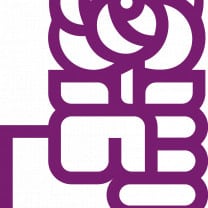
Number of seats: 74
The Socialist Party is the successor of the communist party, the Albanian Workers’ Party, during the communist time the sole legal political party in Albania. In 1991, the party participated in the first free elections and won a clear majority, 169 out of 250 parliamentary seats. However, the government formed after the elections fell apart after a month. Subsequently, a committee of national salvation was formed, but they also collapsed in half a year. In the national elections held thereafter in March 1992, the Socialists lost a large share of its supporters and the party was trumped by the Democratic Party; the SP won only 38 seats in 1992 and in the national elections in 1996 merely 10 seats.
According to the SP, the parliamentary elections in 1996 were not free and fair. The party accused the Democratic Party of intimidation, the DP won 122 out of 140 seats in the first round, and international observers concluded that the elections did not meet the international standards nor the standards of Albanian law. In 1997 premature elections were held, due to a period of riots after failed financial investment schemes by the government. The elections meant a clear victory for the SP and with 101 seats the Socialist formed the government. In the parliamentary elections of 2001 the SP was again the majority with 73 seats in parliament.
The parliamentary elections of July 2005 meant a comeback for the Democratic Party, after the SP lost its majority with 42 seats and became subsequently an opposition party. Because of the election results, the party leader of the SP and former PM Fatos Nano, resigned in September 2005. Led by Nano, the SP helped to reform the old communist party and under his leadership the SP became a member of Socialist International. The successor of Fatos Nano is Edi Rama, the former Mayor of the capital Tirana between 2000 and 2011. With Rama, a new era of development for the Socialist Party began, as he never had direct links with the former Stalinist regime.
The loss of the party in the elections of 2005 could be partially explained by a split within the SP itself. In the summer of 2003, Paksal Milo, former Minister of Foreign Affairs, split from the Socialist Party due to internal disputes about the party’s leadership. Milo formed a new party, the Social Democracy Party, and joined the government with this new party. In 2004, former Prime Minister Ilir Meta left the SP as well, due to persistent disagreements with Fatos Nano, which led to the formation of the Socialist Movement for Integration (LSI). In the elections of 2005 the two new socialist parties won respectively 2 and 4 seats in parliament.
In the June 2009 parliamentary elections, the SP won as an individual party the highest number of votes, however, it was the centre-right coalition led by the Democratic Party that won a majority of votes and the largest share of seats in the parliament. The SP became again, with 65 seats, an opposition party. The SP accused the government, and the DP in particular, of electoral corruption, called for a recount, and boycotted the National Assembly for several months.
In the June 2013 parliamentary elections, the Alliance for a European Albania won convincingly by obtaining 57.7 percent of the votes (84 out of 140 seats). This left wing coalition – united under the name Rilindje (Renaissance) – was headed by the Socialist Party of Albania (SP). Left wing Socialist Movement for Integration (LSI), that was part of the former conservative led government, was part of the same Alliance. Former major of Tirana and SP leader Edi Rama was installed as Prime Minister.
On 25 June 2017, the latest parliamentary elections took place in which the SP won convincingly by obtaining 48.3 percent of the votes (74 out of 140 seats). Since 71 seats are needed for a majority, there will not be a parliamentary coalition. Edi Rama will remain as Prime Minister. During the 25 April 2021 elections, the party also gained 74 seats. This allowed Rama to continue as Prime Minsiter for a third consecuative term.
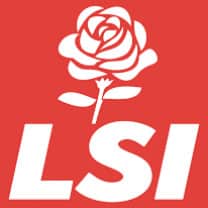
Number of seats: 4
Freedom Party of Albania, formerly known as the Socialist Movement for Integration (LSI), was formed as a splinter party from the SP after Ilir Meta quit the Socialist Party due to a disagreement about the re-election of Fatos Nano during a party Congress in December 2003. Ten other deputies, among which popular ex-members of the chairmanship, joined the movement. The LSI announced its conversion into an independent political party in a founding Congress in September 2004. In the June 2009 parliamentary elections, the LSI won 4 seats, and joined the Democratic Party led alliance to form a government coalition. In the run up to the election the reform of election law was discussed which would increase the threshold to get into parliament. This increase, supported by the SP, could have left LSI out of the parliament.
In the 2013 parliamentary elections the LSI gained 16 seats. While the LSI was part of the former conservative led government, the party was part of the winning left-wing coalition Alliance for a European Albania in the elections of 2013. In the 2017 elections, the LSI increased its number of seats by 3, achieving a total of 19 seats. However, since the Socialist Party gained a comfortable majority, there is no need for a parliamentary coalition. This puts the LSI in the opposition. After joining forces with the Democratic Party (DP) in an unlikely opposition alliance, the pre-election coalition was unable to gain a majority of the votes. In the 2021 elections, the party lost many of its seats, which decreased from 19 to 4.
The Freedom Party is a social-democratic party in nature, oriented towards a liberal market economy that operates and progresses within a social welfare state. The party is based on social democratic values and the core objective is: a cohesive Albanian society integrated into European and Euro-Atlantic institutions.
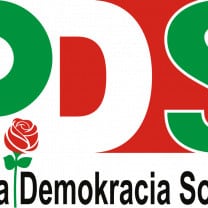
Number of seats: 3
The Social Democratic Party of Albania (PDS) is a minor political party in Albania founded on social-democratic principles. The party held seats in Parliament between 1992 and 1996, and again from 1997 until 2009. It is currently led by Skënder Gjinushi, a former Chairman of the Parliament of Albania (1997-2001) and Minister of Education (1987–1991).
The 1992 parliamentary elections were the first elections in which the Social Democratic Party of Albania took part, and the party managed to obtain 7 seats. The third election, in 2001, was less successful as they had to give up three seats. In 2005, the number increased again from 4 to 7 seats. Since the 2009 and 2013 elections did not result in any seats, 2017 was a small victory for the party. In 2021, the party increased its share of seats from 1 to 3.
Other Parties
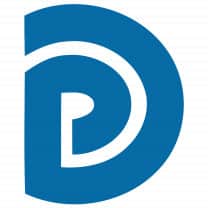
Number of seats: 50
The Democratic Party of Albania is a centre-right political organisation, and the main governing party from 2005 to 2013. The DP is an observer member of the European People’s Party (EPP), the European umbrella for centre-rights parties, and a full member of the Centrist Democrat International.
The Democratic Party was founded in 1991, following student demonstrations that brought down the communist regime. DP was the first opposition party to be formed after the fall of the one-party system. During his first time in government - between 1992 and 1997 - Berisha tried to increase presidential power but was accused of trying to impose an authoritarian regime. He also introduced changes towards a market economy, which only favoured a small percentage of the population, while the majority of Albanians lived in still harsher poverty. When in 1997 snap elections were called to pacify a civil unrest that broke out following the bankruptcy of a series of pyramid-style investment schemes, the DP became an opposition party.
The style of the DP has always been one of confrontation. Only in recent years - after significant pressure by the United States and the European Union - the party has adopted a more co-operative behaviour. In the period out of office, Berisha has retained his seat in parliament, but frequently boycotted the body in protest at alleged government corruption and incompetence. He often accused the incumbent government of Prime Minister Fatos Nano of masterminding a number of murders and assassination attempts on opposition politicians.
In the parliamentary elections of 2001, the Democratic Party formed and led the Union for Victory Coalition (UfV), a coalition of right-wing political parties. The four partners were Movement of Legality Party (ML), Republican Party (RP), National Front (NF) and Liberal Democratic Union (LDU). The UfV alliance won 46 seats in parliament, against 73 seats for the Socialist Party. The remaining 21 seats were allocated among five small parties.
It was not until the parliamentary elections of 2005 that the DP regained their power. In the elections of 2005 the party won 56 seats in parliament, and together with other small rightist parties, it formed the government and enjoyed a comfortable majority in the parliament. In the elections of 2009 the DP received 67 seats, however, still not enough to form a majority. Sali Berisha chose his former socialist opponent Ilir Meta and his LSI to form a coalition, and for the first time in the political history of Albania, a centre-left party coalition was formed. The LSI were offered three important ministerial portfolios, namely foreign affairs, economics and healthcare. Not surprisingly, Rama’s SP loudly criticized the newly-formed coalition, considering LSI’s alliance with Berisha as a betrayal of the left.
In 2013, with the win of the left-wing coalition Alliance for a European Albania, outgoing PM Sali Berisha's longest rule since the collapse of the communist regime in Albania ended. It took some time after the 2013 election results came in until Berisha conceded defeat on 27 June: “We lost this election and the responsibility falls only on one person, Sali Berisha,” he said. “I have decided to resign from all my leadership positions in the Democratic Party but stay on as a member and as an MP,” he added.
During the 2017 elections, the party lost some of its seats, dropping from 50 to 43. The party remained in opposition. Two years later, during the 2019 local elections, it boycotted the election. Together with other opposition forces, they accused Prime Minister Edi Rama and his Socialist Paty (PS) of election fraud and corruption. Shorlty before the 2021 parliamentary elections, the DP joined forces with the Socialist Movement for Integration (LSI) in a pre-election coalition. They were unable to gain a majority of the votes, despite the DP increasing its share of seats from 43 to 59.
4 Biographies
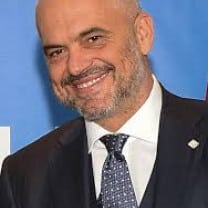
Edi Rama was born on 4 July 1964. At the time the Communist regime fell, Rama was a professor at the Albanian Academy of Arts. In 1995, he received a scholarship and moved to Paris. In 1998, he returned to Albania and was appointed Minister of Culture by the acting Prime Minister, a position he held until 2000. At that time he was not yet member of the Socialist Party of Albania (PS).
In October 2000, Rama ran in the local elections in Tirana as an independent candidate, yet supported by the PS. With 57 percent of the votes he was elected Mayor of Tirana. Many of Rama’s most clear policies were aimed at transforming the appearance of the capital and its atmosphere. Rama united with students to improve the surroundings of the city, and with the Clean and Green Project he created 96,700 sq meters of green land. In December 2003 and in February 2007, Rama was re-elected for his second and third term, despite criticism he had faced.
In October 2002, Rama was awarded for his work in the field of environmental issues, which have contributed to the fight against poverty. The award was granted by the United Nations’ General Secretary, Kofi Annan. In 2004, Rama was chosen World Mayor 2004 and in 2005 he was included in Time Magazine's list of European Heroes.
Rama joined the PS in October 2003. Two years later, he replaced Fatos Nano as the leader of the PS, after the party was defeated in the elections. He was re-elected as the party’s leader in September 2009. The vote was called after the PS lost the general elections on June 28, 2009, to the Democratic Party. Since 2013, Rama has been Albania's Prime Minister. During both the 2017 and 2021 parliamentary elections his PS gained 74 seats in parliament, allowing them to form a government without a coalition partner. The 2021 elections paved the way for a third consecuative term as prime minister.
Rama was one of the founders of the Democratic Movement, which took part in bringing about the collapse of the communist state between 1990 and 1992. He was a founding member of the Movement for Democracy, a political group which played a determining role in the struggle for democracy during 1996 and 1997. Rama has written several articles and analyses for newspapers and magazines. He is also author of different personal painting exhibitions in Europe, North and South America.
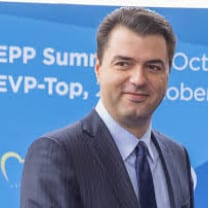
Lulzim Basha was born on 12 June 1972. After attending the Sami Frashëri High School, he studied Law at Utrecht University in the Netherlands and worked for the International Criminal Tribunal for the former Yugoslavia as member of the investigation team of war crimes of Serbian forces in Kosovo. Basha joined the Democratic Party of Albania in January 2005 and became a member of the party's Presidency in May of that year. He has since held several ministerial positions in Democratic Party-led governments.
In 2011 Basha was the governing party's candidate for the post of Mayor of Tirana. He defeated the leader of the Socialist opposition, Edi Rama, by a very narrow margin (only 81 votes after the recount) in a hotly contested election. He served as Mayor until 2015.
After the defeat of the Democratic Party-led coalition in the 2013 parliamentary election and the resignation of Sali Berisha as party leader, Basha was elected as chairman of the Democratic Party in 23 July 2013, following the first one-member-one-vote election in party’s history. He has been the party's leader since then, despite the party losing some seats during the 2017 elections. Basha's position as party leader has been under criticism after the 2021 elections. Despite his party winning 13 seats and forming an unlikely alliance with the Socialist Movement for Integration (LSI), he did not manage to topple Prime Minister Edi Rama's government. He later resigned as party leader due to pressure from within the party and discontent over the election results.
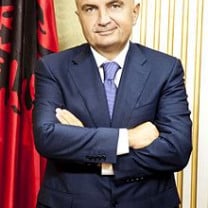
Ilir Meta is the former President of Albania from 2017-2022. He was elected on 28 April 2017 with 87 out of 140 votes. He is also the Leader of the Freedom Party of Albania (PL). The party was established in September 2004 by Meta, after he left the Socialist Party of Albania (PS). During previous parliamentary legislatures, Meta served as the Speaker of Parliament (2013-2017), as Deputy Prime Minister and Minister of Foreign Affairs (2009-2010) as well as Deputy Prime Minister and Minister of Economy, Trade and Energy of the Republic of Albania (2011). Meta is a strong campaigner and advocate for both regional and European integration, and strives for further stability and peace in the Western Balkans.
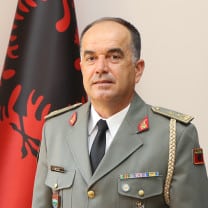
Bajram Begaj (1967) is an Albanian former military officer and politician, and President of Albania from 24 Julu 2022 onwards. He succeeded Ilir Meta and is Albania's 9th president.
Begaj has served for 31 years in the military, in various positions. He has been the army's chief-of-staff since 2020, and before held post in public and military hospitals and trained in the U.S. on defense management.
Begaj was nominated by the incumbent Rama-led administration, and it is expected that he will keep a low profile in comparison to Meta, who frequently fell out with Rama on various issues.
Subscribe to our newsletter
